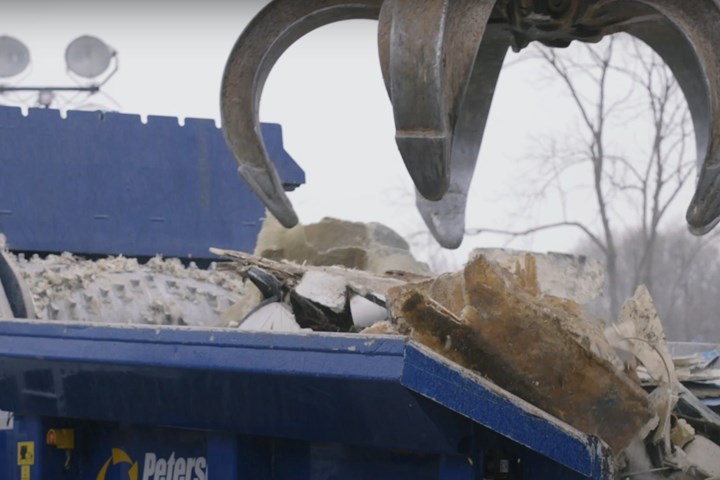Rhode Island boat recycling program plans expansion to other states
Having recycled 60 tons of fiberglass in two years, the RIMTA program will expand to Conn., Mass., Maine and Wash. state via funding from the NOAA Marine Debris Program.
Share
Read Next

In the Rhode Island Fiberglass Vessel Recycling Program, composite boats are shredded to provide energy for cement kilns and feedstock for cement. Source | RIMTA youtube video
The Rhode Island Marine Trades Association (RIMTA, Bristol, R.I., U.S.) has been leading the Rhode Island Fiberglass Vessel (Boat) Recycling Program since January 2018. The program has tested and verified a viable recycling process and organized a network of partners to address end-of-life boats in a responsible and sustainable manner. That pilot program will now be expanded to four additional states — Connecticut, Massachusetts, Maine and Washington — thanks to Rhode Island's federal congressional delegation and a $105,452 grant from the National Oceanic and Atmospheric Administration (NOAA) Marine Debris Program.
“I’m very proud that the Rhode Island Marine Trades Association and Rhode Island Sea Grant have pioneered an environmentally and financially sustainable model for recycling fiberglass boats,” said Rhode Island Senator Sheldon Whitehouse, who authored the Save Our Seas Act, which reauthorized NOAA’s Marine Debris Program in 2018. Whitehouse is a longtime champion for the local composites industry and helped convene the Rhode Island Composites Alliance. “This award from NOAA’s Marine Debris Program is an investment in expanding the Rhode Island model for reducing the harmful, polluting marine debris in oceans and waterways across the country.”
In 2016, RIMTA and the Rhode Island Sea Grant Program pioneered a method of utilizing fiberglass boat material for the production of cement. Over the past two years, the Rhode Island Fiberglass Boat Recycling Program run by RIMTA has recycled more than sixty tons of fiberglass materials using the new process, successfully diverting old boats from infinite burial in landfills or from being scuttled and polluting the oceans.
The RIMTA Foundation, which is developing a sustainable financial model for fiberglass boat recycling, will use the federal funding to assist Washington and states in the New England region with improving upon and replicating the Rhode Island Fiberglass Boat Recycling Program.
“As stewards of the environment and its sustainability, RIMTA and its member companies are proud to explore innovative ways to recycle end-of-life fiberglass boats and more,” said Wendy J. Mackie, CEO of both RIMTA and the Composites Alliance of Rhode Island. “NOAA’s backing on this endeavor comes at a critical time in the project’s progress. We are incredibly grateful for their trust and support.”
RIMTA represents all components of the recreational boating industry in Rhode Island. The organization is dedicated to growing the marine trades through advocacy, education and promotion, and positioning the Ocean State as a worldwide leader in the marine industry.
For more information on how to support this effort, please email info@rimta.org with "Fiberglass Recycling Program" in the subject line.
Related Content
-
Alliance for European Flax-Linen and Hemp reports increasing flax fiber adoption in marine
The natural fiber is increasing traction across several marine applications, including in projects by Greenboats, Northern Light Composites, the Beneteau Group and others.
-
Chantiers de l’Atlantique reveals 66-meter, all-composite SolidSail mast
A technological feat, the large carbon fiber mast prototype targets the Silenseas sailing liner and sailing cargo ships for up to 40% reduction in CO2 emissions.
-
Revisiting the OceanGate Titan disaster
A year has passed since the tragic loss of the Titan submersible that claimed the lives of five people. What lessons have been learned from the disaster?
















